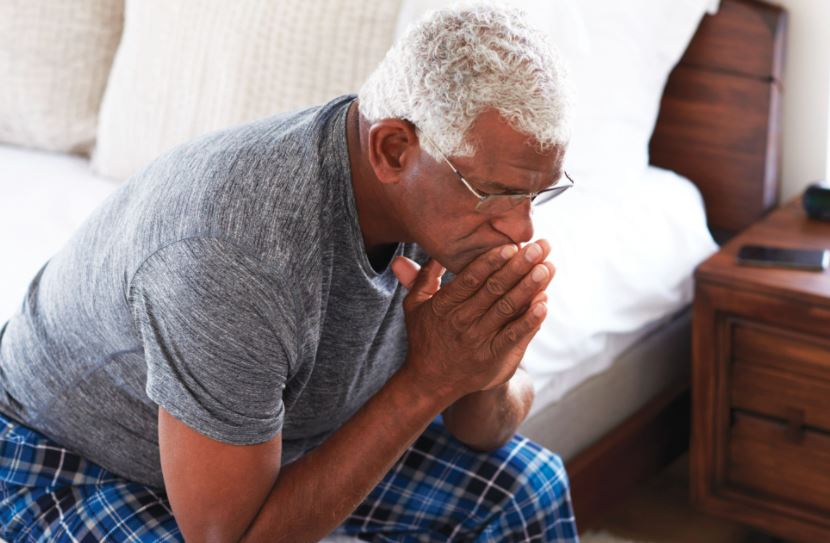It could be REM sleep behavior disorder…
Thrashing against imaginary intruders? Calling out while dreaming? Sometimes these nocturnal outbursts bother a bedmate more than the wild sleeper. However, even if you sleep alone, it might be worth asking your doctor about.
WHEN IT BECOMES A PROBLEM
Neurologist Erik St. Louis, MD, MS, explains that patients with REM sleep behavior disorder (RBD) tend to act out their dreams by talking, waving their arms or even kicking their legs. Dr. St. Louis says these dreams are often violent, causing the sleeper to behave aggressively—even though they are asleep—and they can accidentally hurt themselves or the person who sleeps beside them.

Patients are frequently unaware of the symptoms unless they fall out of bed or wake up with bruises. Dr. St. Louis says sometimes these injuries can be significant, but most often the outbursts are only noticeable to the bedmate. In fact, it is frequently a spouse who is sick of being woken up who encourages the patient to talk to a doctor about the occurrences.
Dr. St. Louis is quick to point out that many people talk in their sleep and do not have RBD. He explains that there are other sleep problems, or parasomnias, that can look similar. Sleepwalking and night terrors are among a category of Non-REM (NREM) sleep disorders that are distinct from RBD.
ACTION VS. PARALYSIS
Each night our brains cycle through phases of REM and NREM sleep. REM stands for Rapid Eye Movement, and this is the stage where most dreaming happens. According to St. Louis, during REM, “you are normally paralyzed—clinically known as atonia—so you don’t act out your dreams. It’s our brain’s way of protecting the body from harm.”
At the Mayo Clinic, where Dr. St. Louis is the head of the Division of Sleep Neurology, patients spend a night connected to devices that measure brain waves as well as body movements, known as polysomnography (PSG) to determine specifics of sleep disturbances. During these sleep studies, doctors can distinguish between RBD, which happens only during the REM stage when your body should be temporarily paralyzed, and other NREM movements, which might be a benign occurrence while transitioning between sleep stages or a different parasomnia. If a patient acts out a dream during the REM cycle, sleep specialists will begin recording information as it pertains to an RBD diagnosis.
IS RBD “BAD”?
One interesting observation Dr. St. Louis makes is that more talking and action behavior doesn’t necessarily mean “worse” sleep. He explains, “There is, surprisingly, not much practical consequence” of RBD. Patients often don’t exhibit signs of REM deprivation. This is an area where more studies may take place. If the patient is acting out a fight scene, for example, why isn’t REM deprivation present? Often because the REM cycle remains uninterrupted in the brain. But how and why could that be the case when other times, the same individual could be easily awakened by a quiet noise? And so it is often the aim to protect the bedmate and the sleeper from injuries caused while asleep, rather than strengthen the quality of sleep. For now, Dr. St. Louis says the main goal of treatment is management of symptoms to prevent injury, as well as protecting the sleep of the bed partner. As bed partners often have to sleep separately, treating RBD can also bring them back together.
Dr. St. Louis cautions that RBD can be “an early indicator that a patient is at high risk of developing a neurodegenerative disease” such as Parkinson’s or dementia, and further investigation can lead to earlier diagnosis. Ultimately, once neuroprotective therapeutics are developed, St. Louis is encouraged that RBD could be an early indicator for treatment to prevent additional damage.
While RBD is not in and of itself harmful to sleep, the actions can result in injury to the sleeper or the bedmate. Treatment is available to minimize the frequency and severity of occurrences and to prevent injury. Additionally, if a patient is over 50, if the behavior is new, or if a new prescription was started around the time symptoms began, Dr. St. Louis recommends talking to a doctor to rule out further concerns as new research has shown a potential connection between anti-depressants and instances of RBD.
………………………………………………………………………….
Shanti Argue is a freelance writer who loves researching and writing about a variety of topics.



